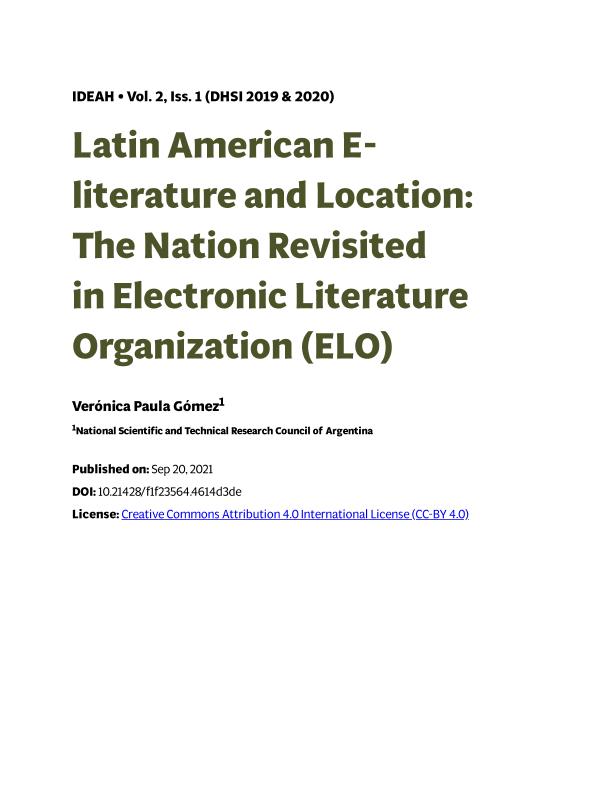Mostrar el registro sencillo del ítem
dc.contributor.author
Gómez, Verónica Paula

dc.date.available
2022-07-21T12:01:59Z
dc.date.issued
2021-09
dc.identifier.citation
Gómez, Verónica Paula; Latin American E-literature and Location: The Nation Revisited in Electronic Literature Organization (ELO); Victoria British Columbia; Ideah; 2; 1; 9-2021; 1-21
dc.identifier.uri
http://hdl.handle.net/11336/162726
dc.description.abstract
In this paper, I focus on the relation between literature and location, as a political address (Derrida). In particular, I analyze how Latin American e-literature refers to the idea of Nation in five pieces of work hosted in the Electronic Literature Collection (ELC), Volume ì. The idea of Nation (Anderson; Gellner) has been largely studied in relation to print literature and national languages, but due to the global visual culture in which we are immersed, there is a deep transformation in the field of arts that gives place to the emergence of electronic literature (Hayles). Initially, the technopoetics (Kozak) hosted in cyberspace seem affiliated with the nomadism and the deterritorialization that dominate the digital world where they are produced and consumed (Beiguelman and La Ferla). But at the same time, there is a set of Latin American productions referred to local languages -legal texts, Spanish language, iconic images, folkloric tradition- into instruments for geopolitical territorialization (Chun). This means that these elements could be used to position Latin America in a global platform, as far as they keep the local characteristics linked to a specific Nation.The nationness (Anderson) is present in some of the Latin American pieces that are partof the Electronic Literature Collection ì: The 27th || El 27, Tatuaje, Anacrón, Bacterias Argentinas, and Grita. Consequently, I examine the ambivalence of location in these eliterature (e-lit) works, considering the following question: what is the function of this reference to the idea of Nation when these productions are hosted in the overflow of cyberspace? My objective is to identify the strategic use of national elements in the aforementioned Latin American corpus.
dc.format
application/pdf
dc.language.iso
eng
dc.publisher
Victoria British Columbia
dc.rights
info:eu-repo/semantics/openAccess
dc.rights.uri
https://creativecommons.org/licenses/by/2.5/ar/
dc.subject
LITERATURA DIGITAL
dc.subject
IDEA DE NACIÓN
dc.subject
LATINOAMERICA
dc.subject.classification
Otras Humanidades

dc.subject.classification
Otras Humanidades

dc.subject.classification
HUMANIDADES

dc.title
Latin American E-literature and Location: The Nation Revisited in Electronic Literature Organization (ELO)
dc.type
info:eu-repo/semantics/article
dc.type
info:ar-repo/semantics/artículo
dc.type
info:eu-repo/semantics/publishedVersion
dc.date.updated
2022-07-01T14:20:05Z
dc.identifier.eissn
2563-3082
dc.journal.volume
2
dc.journal.number
1
dc.journal.pagination
1-21
dc.journal.pais
Canadá

dc.journal.ciudad
Victoria
dc.description.fil
Fil: Gómez, Verónica Paula. Consejo Nacional de Investigaciones Científicas y Técnicas. Oficina de Coordinación Administrativa Saavedra 15. Instituto de Investigaciones Bibliográficas y Crítica Textual; Argentina
dc.journal.title
Ideah
dc.relation.alternativeid
info:eu-repo/semantics/altIdentifier/url/https://ideah.pubpub.org/pub/0mbx8yyz
dc.relation.alternativeid
info:eu-repo/semantics/altIdentifier/doi/http://dx.doi.org/10.21428/f1f23564.4614d3de
Archivos asociados
